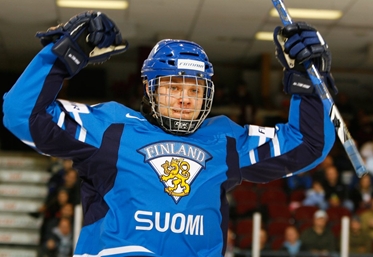The kids are all right
The kids are all right
U18 players keep on making their mark

 Mikael Granlund became the youngest player ever to suit up for Finland at the World U20 level at age 16 in Ottawa 2009. Photo: Phillip MacCallum / HHOF-IIHF Images
Mikael Granlund became the youngest player ever to suit up for Finland at the World U20 level at age 16 in Ottawa 2009. Photo: Phillip MacCallum / HHOF-IIHF Images
It’s often said that “this is a 19-year-old tournament”.
That often holds true. For instance, when Russia captured gold in 2011, the only player who wasn’t 19 was budding superstar and future 2012 MVP Yevgeni Kuznetsov (18).
But then again, when the Swedes won their first title in 31 years in Calgary in 2012 they had nine players under 19, and that included two 17-year-olds, Sebastian Collberg and Filip Forsberg.
So you just never know.
Some eyebrows were raised when Canada included two 17-year-old forwards – linemates Nathan MacKinnon and Jonathan Drouin of the Halifax Mooseheads – on its roster for the 2013 tournament in Ufa, Russia.
Traditionally, the Canadians, with their great depth, shy away from U18 players at the World Juniors. But dressing John Tavares and Steven Stamkos at the 2008 World Juniors, for instance, certainly didn’t hurt Canada en route to a gold medal victory over Sweden.
Will MacKinnon, widely touted as the top pick for the next NHL draft, and Drouin, whose 48 points with Halifax leave him just four behind of his ultra-mature centre, enjoy similar success this year?
"We feel this can't be a team selected purely on age," 2013 Canadian head coach Steve Spott said. "Jonathan and Nathan have proven they can compete at this level."
This will be the first time Canada has used two 17-year-olds in a lockout year. Defenceman Wade Redden played in Alberta in 1995, while Sidney Crosby made his second straight World Junior appearance in 2005. Both years saw Canada take the title convincingly.
Continue readingThere have been other Canadian World Junior difference-makers under 18.
Wayne Gretzky made his lone tournament appearance in 1978. The “Great One” took the tournament scoring title with 17 points in six games as Canada settled for bronze on home ice.
At age 16 and 17, hulking centre Eric Lindros earned consecutive gold medals in 1990 and 1991. Jason Spezza and Jay Bouwmeester were likewise 16 and 17 when they won back-to-back bronze medals in 2000 and 2001.
And Canada isn’t the only country that dips effectively into its U18 talent.
In its 1980s heyday, the Soviet Union got some great World Junior outings from 17-year-olds. The late goalie Yevgeni Belosheikin was named a tournament all-star when the Soviets went unbeaten in Sweden in 1984. Pavel Bure exploded on to the U20 scene in 1989, as the winger’s eight goals tied him with Jeremy Roenick for the tournament lead and the Soviets took gold again.
“He was always just one stride away from being on a breakaway. He was jet-propelled,” Roenick said in his new autobiography.
Or how about Finland? Shifty offensive defenceman Reijo Ruotsalainen added five points in his 1977 debut in World U20 competition when he was just 17.
At the 2009 tournament in Ottawa, 16-year-old centre Mikael Granlund became the youngest player ever to represent his country – a great stepping stone in a career that’s already become legendary for his wraparound, lacrosse-style goal against Russia in the semi-finals of the 2011 Worlds.
In 2012, Aleksander Barkov was just 16 years and four months old when he became the youngest player ever to score for Finland at this tournament.
Barkov, a dynamic power forward, is expected to lead the way on the ice for the Finns this year. Another team with tenuous medal hopes will be seeking big things from a 16-year-old. The Czech Republic’s talented Jakub Vrana will be the youngest participant in Ufa, and the slick winger has seen ice time with the Swedish Elitserien’s Linköping this season.
From Finland’s Artturi Lehkonen to Sweden’s Jacob de la Rose to Russia’s Valeri Nichushkin, other 17-year-olds taking part this year have shown they can compete against adult male pros.
Sometimes, of course, the participation of a player under 18 at the U20 level is as much a reflection of his country’s relatively thin depth as his own talent.
The youngest player ever to pot a goal at the World Juniors was Kazakhstan’s Viktor Alexandrov in 2001. He was just 15 – and amazingly, he was 14 when the tournament in Moscow kicked off. But apart from a 20-goal campaign with Metallurg Novokuznetsk in 2007-08, Alexandrov hasn’t gone on to rival the fame of his father, former Soviet national team member Boris Alexandrov.
Arguably the best-known 15-year-old to compete at the World Juniors also hails from a former Soviet republic. Andrei Kostitsyn, who’s spent this season with the KHL’s Traktor Chelyabinsk, made his World Junior debut for Belarus at the tender age of 15 years, 10 months, and 23 days in 2001. He was held pointless in that tournament.
It’s rarely wise to place a U20 squad’s fortunes squarely on the shoulders of a kid who’s 16 or 17. But when coaches take the attitude that “he’s here in a support role and if he does more, that’s a bonus,” beautiful things can happen.
Back to Overview





















































